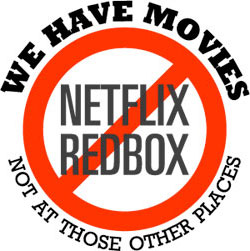Everything we know about 4K Ultra HD Blu-ray (right now)
Posted Monday, January 18, 2016 at 4:27 PM Central
Last updated Monday, January 18, 2016 at 5:08 PM Central
by John Couture

Welcome to the 4K Ultra HD Blu-ray revolution. We know that there's been a lot of confusing information out there about the next step in packaged home media entertainment, but we finally have some of the answers.
Over the course of the last six months or so, the 4K and/or Ultra HD Blu-ray question has come up daily. Tim and I knew a little about it, but to be honest, details were sketchy at best, even for us professionals in the industry. Things really started to firm up in December and we are finally starting to see actual 4K Ultra HD Blu-ray consumer products in the wild.
We always knew that we were going to cover Ultra HD Blu-ray offerings, but we waited until we had all of the facts in order before we launched our coverage to try and mitigate the confusion. Because, let's face it, there's a lot of confusion and misinformation out there in the market.
But don't worry, we have you covered. This story is equal parts education, helping everyone understand exactly what these new Ultra HD Blu-rays are, and equal parts announcement of our new 4K UHD tab (see above). Right now, we are simply line-listing the 4K Ultra HD Blu-rays on this page so that you have a handy list of these nascent offerings.
Eventually, we will incorporate them into the site fully and you will be able to sign up for 4K Ultra HD Blu-ray alerts. But, for now, the list was the easiest and quickest way we could come up with to shed light on this new format. We will continue to update this story with information as it comes out.
What is Ultra HD Blu-ray?
Officially, the next step in home entertainment is known as Ultra HD Blu-ray (UHD). In a nutshell, Ultra HD Blu-rays offer a sharper, clearer image with a wider range of brighter colors. The discs have a much high capacity (66Gb or 100Gb) than ordinary Blu-ray discs (50Gb). This site has the best explanation with hands-on tools that really do a great job of highlighting the differences between the various formats.

From the artwork that has popped up on Amazon for the initial wave of UHDs, the studios are incorporating the 4K in front of it and dropping the Blu-ray part of it. While I can understand why the studios are opting for 4K Ultra HD, it doesn't really help to clear up the confusion.

If I had to guess, they included the 4K part because that is the buzzword that has been in use over on the TV side of things for the last couple of years. My guess is that they dropped the Blu-ray part so as to differentiate these offerings from normal Blu-rays. Basically, 4K Blu-rays, Ultra HDs, Ultra UD Blu-rays and 4K Ultra HD Blu-rays are all interchangeable and refer to this next evolution in home entertainment. Which leads us to the next question.
Will I need special equipment to watch an Ultra HD Blu-ray?
Yes. In order to play and get the most out of Ultra HD Blu-rays, you will need a 4K Ultra HD TV and an Ultra HD Blu-ray player. Chances are good that if you have purchased a TV in the last year or so, that you already own a 4K Ultra HD TV. The consumer electronics industry has been pushing them as the next step in TV and the massive price drops in the last year have finally made them almost as affordable as boring old HDTVs.

The other device that you need is one that you don't own yet unless you happen to be an industry professional. The first consumer available Ultra HD Blu-ray player is hitting the market in February. The Samsung UBD-K8500 4K Ultra HD Blu-ray Player, currently available for preorder at Best Buy, is the first player to market and carries a "reasonable" early adopter price tag of $399. Other manufacturers like Panasonic and Sony hinted at CES earlier this month that they will have players ready to hit the market later this year, but no dates are currently available.
So, now that you have the 4K Ultra HD TV and the Ultra HD Blu-ray Player, I bet you're thinking that you'll probably need a special HDMI cable to connect the two. The answer is muddy at best. Of course, the big box consumer electronics store is going to try and convince you that you need new $100 HDMI cables, but that might not be the case. The real answer is that since the Ultra HD Blu-ray Player is so new, no one has tested the various HDMI cables to get a firm answer.
Not to bog you down in the jargon, but the old HDMI cables that you bought for your Blu-ray player or DVR or PS4 are most likely HDMI 1.4 cables. There are newer cables on the market called HDMI 2.0 (and technically HDMI 2.0a), but it seems that the important factor in your HDMI cable is the speed of transfer. There are standard-speed and high-speed HDMI cables and as long as you have a high-speed HDMI cable, you "should" be covered even if it's an older HDMI 1.4 cable.
Also, you don't have to spend ridiculous amounts of money to get a cable that works. For instance, I recently bought this cable for $10 as it is both HDMI 2.0 and speed tested up to 18Gbps. I will check back when I get my Ultra HD Blu-ray Player and let you know how the various HDMI cables that I owned performed with the new format.
What's the difference between Ultra HD Blu-rays and Blu-rays "Mastered in 4K"?
That's a good question. Simply put, Ultra HD Blu-rays are a different format that is only playable on an Ultra HD Blu-ray Player while "Mastered in 4K" Blu-rays are ordinary discs playable on any Blu-ray player that have been mastered to take advantage of the upconverting done by 4K Ultra HD TVs. Basically, Sony created the "Mastered in 4K" Blu-rays last year to try and take advantage of early adopters of the 4K Ultra HD TVs that were looking for any sort of 4K content.

We have listed all 18 items that Sony put out on our 4K UHD and tried our best to explain the difference. We don't know if Sony will now discontinue this line in favor of "true" Ultra HD Blu-rays or continue to release films as only being "Mastered in 4K." We will keep you posted on any updates to this line.
Will Ultra HD Blu-ray Players play regular Blu-rays?
Yes, Ultra HD Blu-ray Players are backwards compatible and will play both regular Blu-rays and DVDs. They are also supposed to upconvert them as well, but it remains to be seen if it will be an improvement over the upconversion done in the 4K Ultra HD TVs from regular Blu-ray players.
Ultra HD Blu-ray Players are also supposed to be backwards compatible and able to 3D Blu-rays. I never bought into the whole 3D TV phase, but if 3D Blu-ray is your thing and you have a 4K Ultra HD 3DTV, then this bit of news is assuredly good for you. Sadly, laserdiscs, Beta and VHS tapes will not be supported.
What studios are providing Ultra HD Blu-rays?
Currently, Sony, Lionsgate, Fox and Warner Bros. have announced Ultra HD Blu-rays, with many of their first wave of titles debuting on March 1, 2016. Universal, Disney and Paramount have not officially announced any Ultra HD Blu-rays yet, but they are all taking a "wait and see" approach.
If I had to make an educated guess, all studios will have Ultra HD Blu-rays by the end of the year barring a complete and utter failure to launch the new format.





